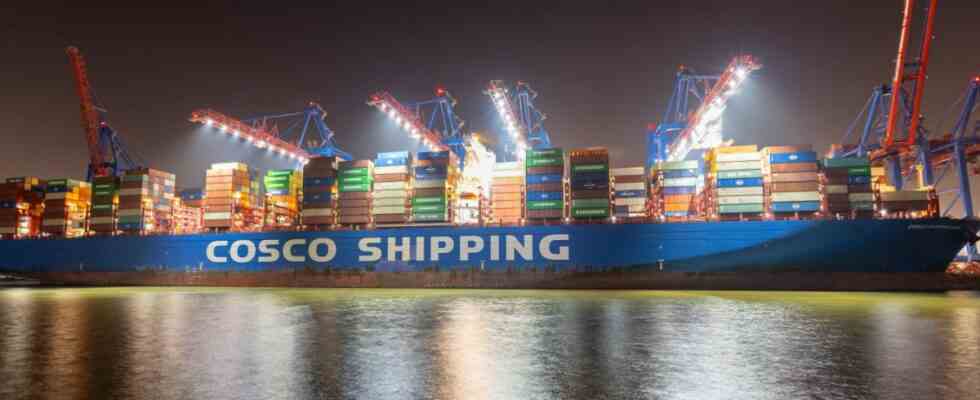Entering the Port of Hamburg is not a pleasure for large ships. The big pots have to go slalom. After the Elbe deepened, silt formed faster than expected in many places. So it’s difficult at the port, so you take care of those who want to make the journey all the more intensively. And the port industry is now hit all the harder by the debate that has reached the highest political level about the planned entry of the Chinese company Cosco.
“The Port of Hamburg will not be sold to China,” is how Hafen- und Logistik AG HHLA captioned its statement on the dispute that had broken out in the government. They urgently wanted to correct this: Formally, it’s only about 35 percent that Cosco is dealing with at the Tollerort terminal want to participate. No, the security in the country is not threatened by this, the company was able to gather, because that is exactly what the dispute broke out about. Chancellor Olaf Scholz is said to be very keen to push through the deal, but six federal ministries are apparently against getting involved – they fear the possibility that China would gain access to critical infrastructure.
Federal Minister of Justice Marco Buschmann reports from the USA
“There are still so many questions to be answered that there is currently no interim result to report,” said Scholz on Friday in Brussels, but emphasized again that it is not “a question of selling the port like in Zeebrugge or Piraeus”, but “at most a participation in a terminal, as is also the case in some western European ports”. In fact, a minority stake in Hamburg would not be a novelty, the architecture of other large ports has long been knitted like this: Shipping companies such as Maersk, MSC and Cosco have been involved in the terminal business there for years. But right now is a bad time to make deals with China and get into new dependencies.
The topic has long spilled over the seas, Federal Minister of Justice Marco Buschmann (FDP) reported via Twitter from the USA, where he had met his American counterpart. “No critical infrastructure in Germany should come under the control of the Chinese government,” he wrote. “Germany should not repeat the mistakes made in relation to Russia with China.” Buschmann was alluding to the political core of the current debate – namely that the Ukraine war has only just made it clear what dramatic consequences it can have when a country makes itself unilaterally dependent on another state.
Cosco is an important tool in China’s Maritime Silk Road Initiative
Cosco is one of the largest logistics groups in the world. It was created in its current form in 2015 through the merger of two Chinese state-owned companies with the aim of building a national champion in logistics. And that is something to be proud of today: in terms of freight volume, Cosco is now number four in the world. In addition, it is also the second largest operator of port terminals with more than 360 berths in 37 ports in Asia, the Middle East, Europe and South America. In Europe, the group holds the majority of the port of Piraeus in Greece, as well as the majority of terminals in Zeebrugge in Belgium and Valencia in Spain. There are minority interests in the port of Vado Ligure in Italy, Bilbao in Spain, Rotterdam in the Netherlands and Antwerp in Belgium. This makes Cosco an important tool in China’s Maritime Silk Road Initiative, with which the government wants to become a superpower in the global freight business. In 2017, the company received a $26 billion loan from a state bank.
In addition, Cosco is also active on the road and rail. In Duisburg, Europe’s largest inland port, which is also the terminus of China’s Silk Road by rail, Cosco is also taking a 30 percent stake in a new container terminal. There, people are watching with concern what the decision in Hamburg could mean for their own location. Groundbreaking was in March.
Federal Economics Minister Robert Habeck renewed his criticism of the deal on the fringes of the Prime Ministers’ Conference in Hanover: Dependencies are not an abstract phenomenon, but “a reality in this world”. A spokesman for Habeck said on Friday that the statutory review period for a possible ban on the project could be extended beyond the actual deadline of October 31 “with the agreement” of those involved; this possibility still exists.

